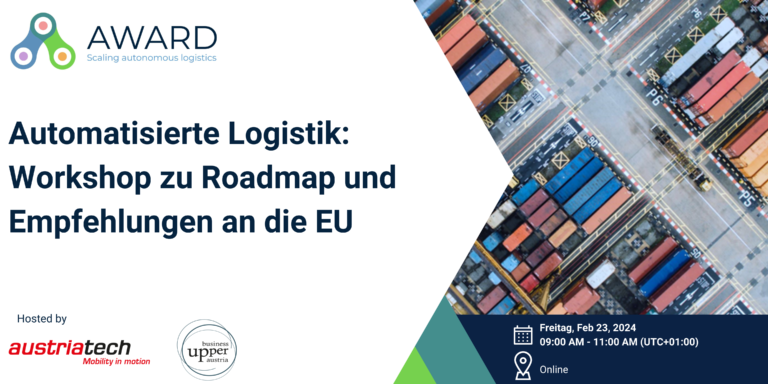AWARD #5 Workshop 2024 | Automated Logistics - Roadmap and Recommendations to the EU
On February 23rd, AustriaTech & BizUp collaborated to host an online workshop focused on shaping the future of automated logistics. Aimed at providing a roadmap and recommendations to the EU, this workshop served as a pivotal platform for professionals and stakeholders interested in the advancement of automated logistics. The workshop, conducted in German, served as a continuation of the discussions and outcomes from the 4th AWARD Pan-European Workshop on “Charting the Roadmap for Autonomous Vehicles in European Logistics”. Building upon the valuable insights gathered from the previous event, AustriaTech & BizUp were dedicated to further advancing the dialogue and actions in automated logistics.
The Roadmap to Automated Vehicle Integration
Immediate and Future Use Cases
The workshop meticulously charted out the trajectory for automated vehicle use cases in logistics, spanning the next 15 years. In the near term (1-5 years), the focus is on implementing delivery robots for last-mile delivery and automating in-house production supplies. As we venture further (6-10 years), the integration of automated last-mile delivery in urban areas and the use of automated forklifts in outdoor spaces are expected to become prevalent. Looking towards a decade and beyond, the vision expands to include EU-wide regulations for automated vehicles on public roads and the advent of L4 trucks in urban areas, heralding a new era of logistics efficiency and innovation.
Envisioning Success: The Bold Steps Roadmap
Hub-to-Hub and Forklift Automation
The workshop attendees didn’t just stop at forecasting; they laid down a “5 steps to success” roadmap for two critical use cases: hub-to-hub transportation and forklift automation. For hub-to-hub, the vision is clear: seamless, fully automated freight transportation to enhance operational efficiency and safety while slashing costs. The roadmap for success includes large-scale tests, joint innovation for a technological framework, establishing a reliable legal basis, and taking steps towards regular operation.
Similarly, for forklift automation, the aim is to achieve full automation for loading pallets indoors and outdoors, irrespective of the existing logistics infrastructure. The steps range from knowledge transfer and technology development to standardization and infrastructure adaptations, ensuring a holistic approach to automation.
Recommendations for the European Commission
The workshop culminated in a series of pointed recommendations for the EU, covering legal frameworks, raising awareness, setting standards, and developing infrastructure.
Crafting a Unified Legal Framework
A resonant theme across the workshop was the urgent need for a uniform EU-wide legal framework for automated vehicles. Participants underscored the importance of creating consistent regulations that facilitate cross-border operations, ensuring that automated logistics solutions can operate seamlessly across the EU. This includes reimagining legal requirements for “new driver’s licenses” for teleoperators and establishing “sandboxes” for real-world testing of automated vehicles in diverse environments. Such a harmonized approach is pivotal in removing legal barriers and fostering an environment where innovation can thrive.
Bridging the Awareness Gap
Raising awareness and educating the public about the benefits and realities of automated vehicles emerged as a critical recommendation. The workshop highlighted the necessity for transparent communication strategies that address public concerns and demystify automation technologies. Expanding pilot regions, standardizing terminologies, and emphasizing the sustainability aspects of automation are key strategies to cultivate societal acceptance. Importantly, this entails preparing the society for the inevitable learning curve associated with automation, including the potential for accidents and the limitations of automated systems.
Setting the Standards High
The establishment of uniform security and operational standards for automated vehicles was another vital recommendation. This includes standardizing gateways for data exchange and creating scenario catalogues for type approval. Such standards are essential for evaluating the impacts of automation across the EU and ensuring the safe use of automated vehicles. They serve as the foundation upon which reliable and efficient automated logistics operations can be built
Infrastructure: The Backbone of Automation
Acknowledging the critical role of infrastructure, participants recommended the development of sector-specific infrastructure plans. This includes considering sector coupling, such as integrating charging infrastructures for electric vehicles with automated vehicle operations. The call for standardized and digitalized infrastructure underscores the need for a supportive physical and digital environment that can accommodate the unique requirements of automated logistics operations.
Beyond Regulations and Infrastructure
The workshop went beyond the usual suspects of legal and infrastructural recommendations, advocating for actions that bolster the EU’s attractiveness for automation technology providers. This encompasses financial incentives for European manufacturers, preventing data monopolies, and promoting the scaling of technologies for deployment. By fostering a competitive and innovative ecosystem, the EU can ensure its leadership in the global automated logistics market
You can download the presentation AWARD H2020 – Presentations (award-h2020.eu) and the concept board in German for free.
*Want to meet us at other events? Keep following AWARD on Linkedin and X(Twitter) to keep updated with its next developments.
